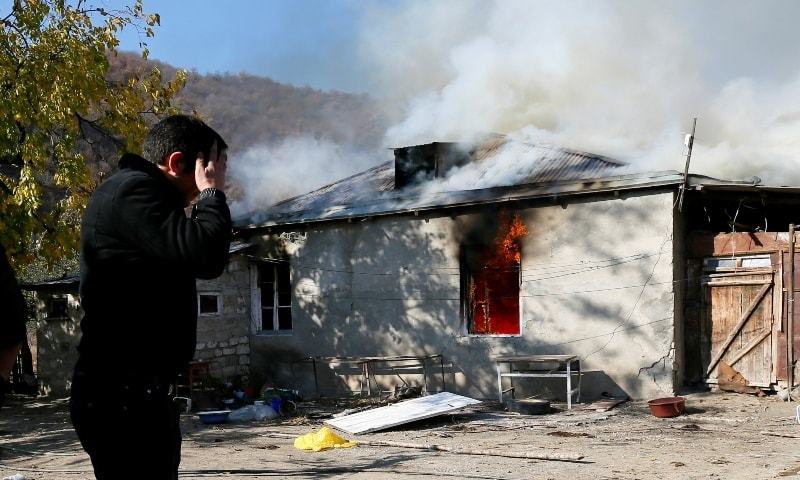BAKU: Azerbaijan announced on Sunday that four of its troops had been killed in the disputed Nagorno-Karabakh region since a peace deal with Armenian separatists was agreed in early November.
The defence ministry said a group of Armenian fighters remained in the mountainous province — breaking the terms of the Russian-brokered truce — and had recently launched fatal attacks on Azerbaijan’s forces.
The ministry said three servicemen were killed in a separatist ambush on November 26 and another sustained fatal injuries during an attack near the village of Hadrut on Tuesday.
Both Armenia and Azerbaijan accused each other breaching the truce that ended six weeks of fighting between the longstanding foes for control of the breakaway region.
Armenia said on Sunday that six separatist fighters were injured in clashes with Azerbaijan troops after skirmishes broke out on Friday evening.
The Armenian defence ministry reported hours of fighting near Hadrut on Saturday, including with heavy artillery, claiming Azerbaijan had bolstered its military presence in the area.
“The Armenian side has six wounded,” the ministry said, describing the incident as an Azerbaijani “provocation”.
The defence ministry said the new fighting was discussed during a meeting in Moscow between Russian and Armenian defence ministers, while the foreign ministry said clashes continued into Sunday.
Azerbaijan said it had been forced to respond to recent fatal attacks on its servicemen by conducting anti-terror operations.
The conflict that erupted in September between the separatists backed by Armenia and Azerbaijan over the mountainous region ended on November 10 with a Moscow-brokered peace deal that saw the Armenians cede swathes of territory.
More than 5,000 people including civilians were killed during the fighting between the ex-Soviet rivals, who fought a war in the 1990s over the mountainous region.
Russia has deployed nearly 2,000 peacekeeping troops to Nagorno-Karabakh as part of the peace deal.
The defence ministry in Moscow said later on Sunday that the ceasefire was being observed again after reporting for the first time a day earlier that it had been violated.
French and US heads of the Minsk Group, which led talks on the conflict for decades but failed to achieve a lasting agreement, met Azerbaijan President Ilham Aliyev in Baku on Saturday.
Aliyev described reports of new fighting as “troubling” and vowed to use an “iron fist” to “crush” Armenian forces completely if fighting erupts again.
Minsk Group envoys Stephane Visconti and Andrew Schofer were expected in Armenia’s capital Yerevan on Sunday.
On a visit to Baku this week, Turkish President Recep Tayyip Erdogan hailed what he called his close ally’s “glorious victory” in the conflict.
The Turkish leader, who attended celebrations marking Azerbaijan’s success, has overtly supported Baku, helping to train and arm its military.
Published in Dawn, December 14th, 2020














































